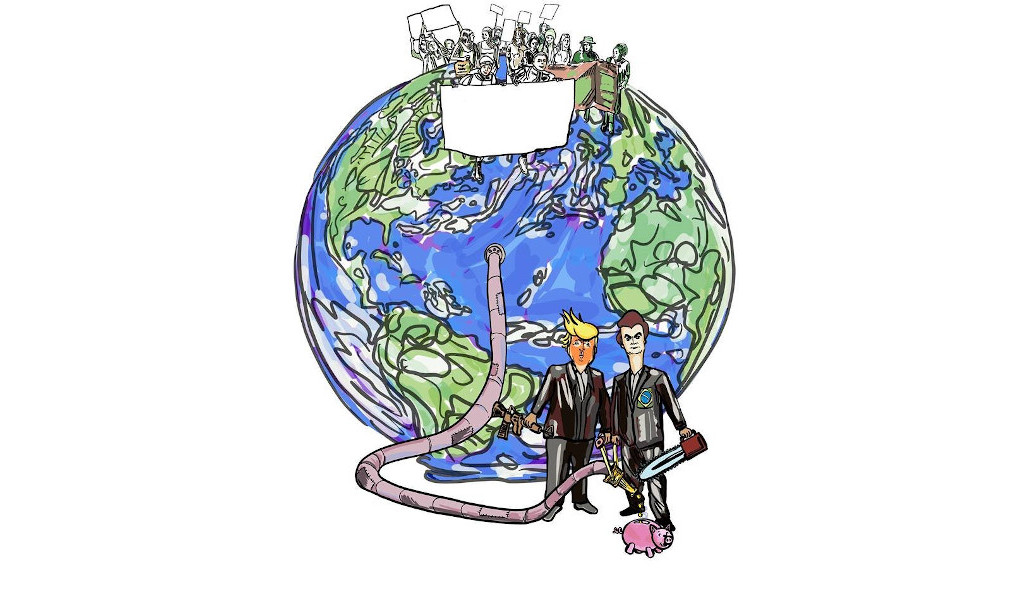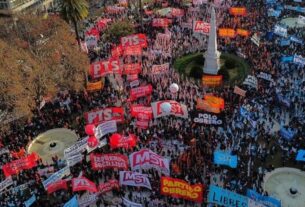Eleni Mitsou is a member of Xekinima (CWI in Greece).
The 2018/2019 school year was marked by the mass youth climate strikes that shook the world. Greta Thunberg, a Swedish school student, at the age of 15, stopped going to school to protest outside the Parliament, demanding that the government treat climate change as a crisis and act accordingly. Sweden had just seen the hottest summer the country had ever experienced and more than 60 wildfires.
Greta’s strike inspired hundreds of thousands of school students all over the world. Weekly climate strikes and demonstrations erupted from Australia to Canada, and from Germany to Belgium, England and so on. At the height of the movement were the two global climate strikes and protests in March and May when between 1.4 and 1.6 million school students and young people took part in 128 countries around the world.
With new global climate strikes and protests planned between 20th and 27th September, the question posed is: how can this movement move forward, grow and achieve its goals?
Whose side are they on?
Under the pressure of the climate movement, governments in Britain, France, Canada and Ireland have declared a climate emergency. However, they have not taken any concrete measures to address global warming and the change in the planet’s climate that derives from it. On the contrary, they continue to give $27,5 billion per year to the fossil fuel industry, both at home and abroad, via subsidies, tax reductions and other financial support.
A number of big company CEOs, who have formed a group called “The B Team,” also claim to support the climate strikes and work on sustainable solutions and policies in their companies. However, a closer look at the ‘sustainable’ proposals and policies that these CEOs offer, reveal they are either pseudo solutions or merely “greenwashing”.
Sir Richard Branson, for example, cofounder of the ‘B Team’ and CEO of Virgin Group has declared that Virgin Airlines use biofuels in a number of flights. However, biofuels are neither a green nor a sustainable solution. A year ago, Branson celebrated the use on a commercial flight of another type of supposedly sustainable jet fuel. Once again, the fuel did not come from renewable energy sources, hydrogen technology or any other green technology. It came from “recycled industrial carbon rich gases.” Virgin claims that the fuel produced by industrial gas recycling emits significantly less greenhouse gas. While this remains to be proven (by scientists who don’t work for Virgin), the fuel is still fossil and the recycling process doesn’t make it green.
Big business CEOs and politicians of the establishment parties who claim to be on the side of the movement cannot be trusted. Scientists have been issuing serious warnings about the effects of greenhouse gas emissions on the planet since the early 1960s. However, the first climate summit was held almost 20 years later, in 1979 in Geneva. It was at about the same time that big oil businesses like Exxon reached the conclusion that burning fossil fuel affects the earth’s climate and that in the next decades there would be a temperature rise of 1-2°C. Forty years later, governments worldwide have failed to take any substantial measures to halt or at least slow down global warming and climate change.
Faced with a climate crisis that threatens life on earth as we know it, capitalist governments are still not willing to take the radical measures needed to address global warming. The reason why, is that they are not willing to clash with some of the most prominent members of the class whose interests they represent, namely the big oil, gas and coal companies and other big industrial sectors that are absolutely dependent on oil and gas for their products and profits, such as the plastics industry.
Fossil fuel industry produces 86% of the energy on the planet (electricity, heating, fuel etc) and according to one of the latest IPCC studies “fossil energy use is responsible for about 85% of the anthropogenic CO2 emissions produced annually.” So, there is no other way to stop further global warming and climate change than to stop mining and burning oil, gas and coal and turning to renewable energy source and other truly green technologies.
Empowering the youth climate strike movement
Climate strikes must therefore continue and they must grow – both in terms of the number of young people who take part in them and the number of countries where the strikes take place but also in terms of developing into working class strikes, particularly general strikes which can paralyse capitalist production and threaten the profits of the capitalist elite. And, of course, such strike activities must be organised more democratically and more effectively.
Social media and personal initiatives have helped immensely to build this movement and organise days of global strike action, but they have also left room for self-proclaimed leaderships to develop, who often compete with one another, call strike action on different dates, different places or both, as is, for example, the case in Belgium. This approach also means that arbitrary demands are put forward and leaves space for the representatives of big business and the establishment parties to join actions pretending to support the movement and its cause.
If climate meetings were held in all schools on a weekly or fortnightly basis, and each school elected a committee or a group of representatives to discuss, plan and coordinate the demands and strike actions with committees in other schools, it would be huge step forward to a more efficient and democratic way of organising the movement and would mobilise even bigger numbers. If the youth committees were in the same way coordinating with similar committees elected on a work place or community basis, then a mighty, extremely powerful movement uniting the youth with the working class would come to the fore.
School students on their own cannot force the capitalists who control the economy and make all political decisions to take the radical coordinated measures needed on a global scale to save the planet.
The climate movement can grow in numbers and strength by linking up with other movements and environmental struggles on a local basis such as the struggle against lignite (brown coal) extraction in Germany, against disastrous gold mining in Greece, Turkey and Rumania, against fracking, deep sea drilling, new fossil fuel pipelines in Canada, England, the US and elsewhere. It is also important to have joint action with the indigenous people in the Americas to preserve their land and their water reserves, or against the destruction of the rainforests in Indonesia, Brazil and Africa, or with the fight of the Ogoni people in Nigeria against Shell.
Links and joint action should also be built with other campaigns and movements such as the global women’s movement, which has organised incredible mobilisations in the past years and won a number of important victories; the LGBTQ+ movement and also the antiracist and antifascist movement – let us not forget that the far right parties and groups are either climate change deniers or in the best case deny that climate change is caused by anthropogenic greenhouse gas emissions.
Most importantly the youth climate strikes must link to the worker’s movement and work towards a unified and consolidated movement of workers and youth. Worker’s strikes have the power to bring down governments, to impose radical changes in society and under certain conditions to bring about revolutions. They have this power because workers are the ones who produce all commodities and services in the society; they produce all wealth, including the profits that make the rich.
The attempt to build such a movement is not an easy task. In an era when the vast majority of union leaders have reached a new level of bureaucratism and degeneration and will not call a strike to fight against redundancies, workplace closures, wage cuts or horrid working conditions it is very unlikely that they would call actual action on the environment. The majority of the union officials ignore the climate strike movement and in the few cases when they verbally support it, they are not prepared to take the lead. Verdi for example, the 2 million strong German service labour union, trying to present itself as fighting against climate change, called on its member to join the climate strikes if they can, but made it clear that it would not call an official strike.
So where unions are controlled by bureaucratic and degenerated leaderships climate change activists must reach out to the rank and file of the unions, the shop stewards and left broad fronts, win them over to the climate strike movement and try to build strike committees in the unions which will organise the rank and file and put pressure on the union leaderships to actively fight against climate change. This will also strengthen genuine resistance to all attacks on workers’ rights, wages and jobs.
Environmental and labour struggle are not opposed to each other. Capitalists and union bureaucrats try in a number of countries and sectors of the economy to counterpose the two, claiming that environmental policies, shifting from carbon to green energy etc will lead, among other things, to job losses and higher taxes. However, if fighting unions and democratically elected committees of workers, youth, local communities etc take control of the process of shifting from carbon to green and sustainable economy, they can guarantee that no jobs are lost, that workers are retrained where necessary, and that they are paid decent wages during the whole process. In addition, the shift to green technologies is, in many cases, the ideal solution to guarantee workers jobs. The workers in the iconic Harland & Wolff shipyard in Northern Ireland, to site just one example, who are fighting to save their jobs demand that the government nationalise the shipyard to save its future. They explain that they could produce wind turbines to play an important role in Ireland’s transition towards green energy and a green economy.
Fighting for the future
The UN has warned that we only have just over a decade to take the measures needed to keep the global temperature rise to 1,5oC compared to the pre-industrial era. This is the global temperature rise that is expected somewhere between 2030 and 2052.
If we can halt global temperature rise to 1,5°C, then the next generation will have a fighting chance of getting back to the “Holocene era” – the age of modern man – or at least close to it – the era in which human civilization developed and is now in danger of leaving. A temperature rise of more than 1,5°C doesn’t mean the end of life on earth. But it does mean the end of life on earth as we know it. The lives of hundreds of millions and even billions of people will be severely threatened, millions of species will be lost, and large parts of our planet will become uninhabitable.
Young people and workers, the environmental, women’s, LGBTQ+ and antifascist movements must fight together against global warming and climate change. And we must be conscious that this is a fight that challenges the capitalist system itself, because the following policies and actions are needed to save the planet and they are incompatible with capitalism and the way it functions.
- Fossil energy use is responsible for about 85% of the anthropogenic CO2 emissions produced annually. We need to end the burning of fossil fuel for energy and plastic production in the next few years and make a drastic turn to technologies that use renewable energy sources (wind, sun, waves etc) and hydrogen. The technology to do that is available. What the system lacks is the political will to make the transition.
- The fossil fuel industry and its products account for 91% of global industrial greenhouse gas emissions and about 70% of the greenhouse gas emissions related to human activity. Just 100 companies globally account for roughly 71% of industrial greenhouse gas emissions and a half of emissions on the planet linked to human activity! None of them will give up willingly the foundation upon which their profits thrive. We need therefore to bring these companies under the ownership and control of society, use their wealth to convert them, without job losses, to companies that will produce energy and fuel using renewable energy sources and hydrogen technology and plan energy production based on social needs and not capitalist profits.
- A very small number of corporations control the vast majority of the world’s food production and trade. They are responsible for 75% of deforestation worldwide, accounting for 15-20% of CO2 emissions, the destruction of other valuable ecosystems and the mass use of agrochemicals which affect both nature and our health. Food and agribusiness are also the second largest contributors to other greenhouse gas emissions, such as methane, (56%). They are responsible for 19-29% of the total greenhouse gas emissions related to human activity. We need to take these corporations from the hands of the capitalists, stop deforestation, organise a mass worldwide reforestation program and plan food production in a sustainable and eco-friendly way, which includes growing more of our food locally, using traditional varieties of seeds and livestock and also (re)educate the population on the issue of excessive meat consumption and its negative effects both on the environment and on personal health.
- We must implement a mass public investment plan in high quality and efficient, free, public transit, eco -friendly construction and house upgrading, recycling and repairing facilities, instead of incinerating waste and/or shipping it abroad. All of these measures are more than affordable if the wealth we all produce is not appropriated by a small elite who control the economy and the political establishment.
- All these actions as well as those needed to repair the environmental damage of ecosystems could provide millions of decent new jobs. Workers in the industries and sectors hit by the necessary transition must be guaranteed jobs and retraining with no loss of pay. Investing in renewable energy provides far more jobs: for every one job provided by fossil fuel investment, the same money produces 5-7 “green” jobs.
- We need a big increase in public funding for democratic and independent scientific research to better understand and combat climate change, to further develop technologies for the production and storage of green energy, to further develop environmental friendly materials (for ex. materials that will replace plastic, environmental friendly concrete and building materials) etc. Government money that now is spent on subsidies, tax breaks and incentives for fossil fuel corporations should be directed to research. There is no need to stress that the results of this research should belong to the whole of society and be used for common welfare. They should not be allowed to be bought, patented and used for profit by big business.
- This is OUR planet, so we should democratically plan and run the economy on the basis of the right of everyone for a life free of poverty, oppression and destruction; on the basis of sustainability to ensure that we all have a future on this planet. Fight capitalism to replace it with a society based on meeting people’s needs, not corporate profits, on environmental respect not destruction, on true democracy not corporate control of the economy and political life: a democratic socialist society!




